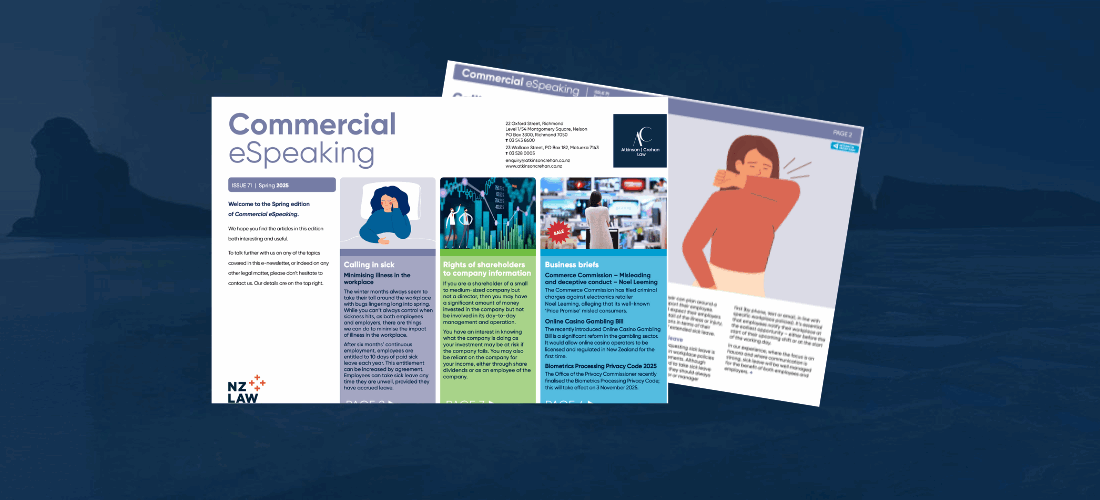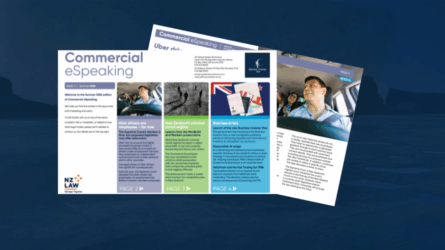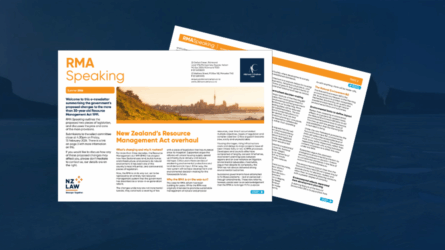Commercial eSpeaking, Spring 2025
Welcome to the Spring edition of Commercial eSpeaking. We hope you find the articles in this edition both interesting and useful. To talk further with us on any of the topics covered in this e-newsletter, or indeed on any other legal matter, please don’t hesitate to contact us.
Calling in sick
Minimising illness in the workplace
The winter months always seem to take their toll around the workplace with bugs lingering long into spring. While you can’t always control when sickness hits, as both employees and employers, there are things we can do to minimise the impact of illness in the workplace.
What does the law say?
There is no statutory or legal entitlement to work remotely or ‘work from home’ if employees are sick. Whether this is permitted depends on employment agreements and workplace policies.
Are you sick or not?
With the increase of remote working arrangements or working from home, the line can be blurred between sick leave and remote working. If an employee is sick, then they should stay home and take sick leave.
This does not mean that they are ‘working from home.’ There is no obligation for employees to work while they are sick. In fact, ensuring that employees have time to properly rest and recover is often more helpful in getting them back to the workplace.
Coming into work when unwell presents a health and safety risk to other employees; those who turn up sick are likely to expect conversations about going home to avoid others becoming ill. In some circumstances this may mean working from home if, for example, an employee feels well enough but is still contagious. If these discussions take place with care and with all individuals in mind, they are likely to be well received.
It is important to remember that any time an employee is not well enough to work, they may take sick leave. This can include sick leave for mental health if the impact of it is adversely affecting the employee’s ability to work.
When is a medical certificate needed?
Generally, employment agreements or workplace policies will set out when a medical certificate is required; this is often required where an employee is sick for three days or longer. In workplaces where there is a high level of trust, medical certificates are usually not needed on every occasion. If there is a prolonged illness or something that is going to have a lingering/flow-on effect, medical certificates are helpful to assist employees and employers to manage the issue.
If there is no medical certificate, understanding exactly what is going on and how long an employee thinks
they may be away from work is important. For an employee, this shows good faith in assisting their employer to manage their absence and workload. That communication can also mean that there is less stress for the employee resulting from their absence from work.
There is no need for an employee to provide every detail of an illness, but the more information that is provided, the better the employer can plan around a situation and support their employee. Employees should expect their employers to ask for more detail of the illness or injury, and what that means in terms of their role, in instances of extended sick leave.
Requesting sick leave
The procedure for requesting sick leave is generally contained in workplace policies or employment agreements. Although employees are entitled to take sick leave when they are unwell, they should always contact their supervisor or manager first (by phone, text or email, in line with specific workplace policies). It’s essential that employees notify their workplace at the earliest opportunity – either before the start of their upcoming shift or at the start of the working day.
In our experience, where the focus is on hauora and where communication is strong, sick leave will be well managed for the benefit of both employees and employers.
Rights of shareholders to company information
If you are a shareholder of a small to medium-sized company but not a director, then you may have a significant amount of money invested in the company but not be involved in its day-to-day management and operation.
You have an interest in knowing what the company is doing, as your investment may be at risk if the company fails. You may also be reliant on the company for your income, either through share dividends or as an employee of the company.
This raises the issue of what information about a company a shareholder is entitled to receive. The Companies Act 1993 governs this.
Right to information under section 216
A shareholder has an absolute right to some fundamental information under section 216 of the Companies Act. This includes:
- Minutes of all meetings and shareholder resolutions
- All written information distributed to shareholders over the preceding 10 years, including annual reports and financial statements
- Directors’ certificates, and
- The company’s interests register (the official list of any potential conflicts of interest the directors may have).
The limited information available under section 216 is unlikely to enable a shareholder to obtain information about significant financial decisions made by the company in time to influence them.
Right to information under section 178
A shareholder has a right to ask for any information held by a company under section 178 of the Companies Act. However, the company may refuse to provide the information or charge the shareholder for providing it. The company may decline to provide information for any reason.
The Companies Act, however, specifically states that a company may refuse to provide information if its release would prejudice the company’s commercial position or that of any other party it is dealing with. It also states that a company may refuse a request that is frivolous or vexatious.
A shareholder may apply to the court to have a company’s decision to refuse to release information reviewed. However, a court application is likely to substantially delay the release of the information and increase the cost of obtaining it, even if the court ultimately orders the release of the information.
Shareholder entitled to see the company’s legal advice?
One category of information that has special rules applying to it is legal advice received by a company. Traditionally, the courts have applied what has become known as the Shareholder Rule. This has meant that a shareholder was entitled to be provided with any legal advice obtained by a company except advice relating to a dispute with the shareholder. It would be very difficult for a company to deal with a dispute with a shareholder if it could not keep its legal advice regarding the dispute confidential.
Recent Privy Council decision
The UK’s Privy Council has recently issued a decision that is likely to become a landmark decision in company law. The court’s decision effectively overturns the long-standing Shareholder Rule. The court held that shareholders are not entitled to any privileged legal advice obtained by a company.
The Privy Council is no longer New Zealand’s highest court; it was replaced by the Supreme Court in New Zealand in 2004. The Privy Council’s decisions are, however, still strongly influential on the development of New Zealand law. Many commentators believe that the New Zealand courts will adopt this approach to the Shareholder Rule. Companies may well, therefore, begin to decline shareholder requests for any legal advice obtained by a company under section 178 of the Companies Act.
It is likely that the New Zealand courts will uphold the refusal by a company to release such information in the future.
Shareholders still have strong rights
Shareholders still have strong rights to obtain information about a company under sections 178 and 216 of the Companies Act, even if they are no longer able to access the company’s legal advice. These rights can be particularly useful if a dispute arises between shareholders in relation to the company’s management or strategic direction.
You should contact us if you have any concerns about the management of a company in which you own shares. There are a number of legal mechanisms contained in the legislation that shareholders can use to protect their position, including the rights to information discussed here. Prompt action, however, is often required to achieve the best possible outcome.
Business Briefs
Commerce Commission – Misleading and deceptive conduct – Noel Leeming
The Commerce Commission has filed criminal charges against electronics retailer Noel Leeming, alleging that its well-known ‘Price Promise’ misled consumers.
The retailer had promoted the promise as a guarantee that customers would always receive a match with a competitor’s price. In practice, however, the exclusions and restrictions in the terms and conditions significantly limited the application of this and many shoppers were unable to rely on the promise as advertised.
The Commission has alleged multiple breaches of the Fair Trading Act 1986 that prohibits businesses from engaging in misleading and deceptive conduct. The Commission emphasised the importance of large retailers being clear and honest in their advertising. It has previously warned businesses that disclaimers buried in fine print may not be enough to correct misleading impressions.
This investigation serves as a reminder to all New Zealand businesses of the importance of ensuring promotional promises are accurate and not undermined by hidden conditions. For consumers, it highlights the need to be cautious of marketing claims that may not tell the full story.
Online Casino Gambling Bill
The government has introduced the Online Casino Gambling Bill. This is a significant reform in the gambling sector that would allow online casino operators to be licensed and regulated in New Zealand
for the first time.
Up to 15 operator licences will be allocated by auction to businesses seeking to offer online casino services to individuals in New Zealand, whether based locally or offshore. It is anticipated that large offshore gambling companies will feature prominently among applicants for the 15 licences. These licences will be valid for three years and renewable for a further period of five years. Operators will be subject to strict conditions, including mandatory age and identity verification, advertising restrictions, harm minimisation obligations and fines of up to $5 million for breaches.
While the Bill is intended to facilitate a safe and compliant regulated online casino gambling market, it has attracted strong opposition from more than 50 sporting organisations. Unlike the current Class 4 ‘pokie trusts’ system, which distributes millions each year to grassroots and community sport, the new framework does not require online casino operators to contribute to community funding. Sporting leaders have warned that the change could severely impact local organisations already facing financial pressure due to a lack of funding.
The Bill is currently before the select committee and a report on the Bill is due in November 2025.
Biometrics Processing Privacy Code 2025
In last summer’s edition of Commercial eSpeaking (#69), we reported on the draft Biometrics Processing Privacy Code. Since then, the Office of the Privacy Commissioner has finalised the Code; this will take effect on 3 November 2025. Organisations already using biometric technologies will have until 3 August 2026 to ensure full compliance.
The Code applies to organisations using automated processes to collect and use biometric information – that is, information about a person’s physical features or behavioural traits, such as facial features, fingerprints, voice or eye patterns.
The Code introduces 13 rules that go beyond the general information privacy principles in the Privacy Act 2020, requiring businesses that collect biometric data to take a more rigorous and transparent approach. These rules can be broadly categorised in the following way:
- Purpose: Organisations must clearly identify why they are collecting biometric information and ensure that collection is necessary, effective and proportionate to that purpose
- Safeguards: Adequate privacy protections must be in place before collection, including measures to reduce privacy risks, ensure system accuracy and strengthen security
- Proportionality: Biometric data should only be collected where there are reasonable grounds to believe that the benefits of collection outweigh the potential privacy impacts on individuals
- Openness: Individuals must be informed about how their biometric data will be used and disclosed so they can make an informed decision about providing it, and
- Use limits: The Code places clear limitations on how biometric data can be used and when it may be disclosed.
Each rule contains specific obligations that may impact how your business collects, uses and protects biometric information. As a result, it is important that businesses review their biometric systems and policies to ensure compliance with the Code as the effective date (3 November) approaches.
To view the full and detailed list of the rules under the Code, please click here.
If you need any guidance on any of the above topics, please don’t hesitate to contact us.



